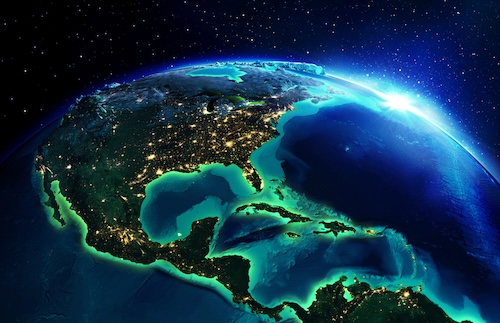
Why My Front Page Story Is the Perfect Wedding Gift
December 31, 2024
South America: A Chronicle of Empires, Independence and Modernity
January 3, 2025A Continent in Motion: The Pivotal History of North America
Photo credit: depositphotos.com
North America, the third-largest continent in the world, boasts a rich and vibrant history that spans over 15,000 years. From the arrival of the first humans to the rise of mighty civilizations and the formation of modern nations, North America’s story is one of resilience, innovation, and cultural diversity.
The First Inhabitants: The Paleo-Indians
The earliest inhabitants of North America are believed to have crossed the Bering Land Bridge from Asia during the last ice age. These Paleo-Indians, skilled hunters and gatherers, adapted to the diverse environments of the continent, developing complex cultures and sophisticated hunting techniques.
The Rise of Civilizations: Mesoamerica and the American Southwest
Mesoamerica, encompassing parts of Mexico and Central America, witnessed the rise of sophisticated civilizations such as the Maya, Aztecs, and Olmecs. These civilizations developed advanced agricultural systems, elaborate architecture, and complex social structures.
In the American Southwest, indigenous peoples like the Anasazi and Hohokam thrived in harsh desert environments, constructing impressive cliff dwellings and irrigation systems.
European Exploration and Colonization
The arrival of European explorers in the late 15th century marked a turning point in North American history. Christopher Columbus’s voyages, while not the first European contact with the Americas, sparked a wave of colonization and exploration.
European powers, including Spain, France, and England, established colonies along the North American coast, bringing with them their languages, cultures, and technologies. This period also saw the devastating impact of European diseases on Indigenous populations.
The American Revolution and the Birth of Modern Nations
In the 18th century, the Thirteen British colonies in North America revolted against British rule, culminating in the American Revolution and the formation of the United States of America. The American Revolution inspired other independence movements throughout the Americas, leading to the formation of independent nations such as Mexico, Canada, and Colombia.
The Shaping of Modern North America
The 19th and 20th centuries witnessed significant transformations in North America. The United States expanded its territory through westward expansion and the Mexican-American War, while Canada emerged as a self-governing dominion within the British Empire.
The Industrial Revolution brought about rapid economic growth and technological advancements, while social movements fought for equality and justice. North America also played a pivotal role in both World Wars, emerging as a global superpower.
Today, North America stands as a diverse and dynamic continent, home to a multitude of cultures, languages, and landscapes. Its history is a complex narrative of human endeavor, shaped by the actions and interactions of Indigenous peoples, European colonizers, and immigrants from across the globe. As we look to the future, North America continues to evolve, facing new challenges and opportunities while embracing its rich and enduring legacy.
Written by Google Bard




